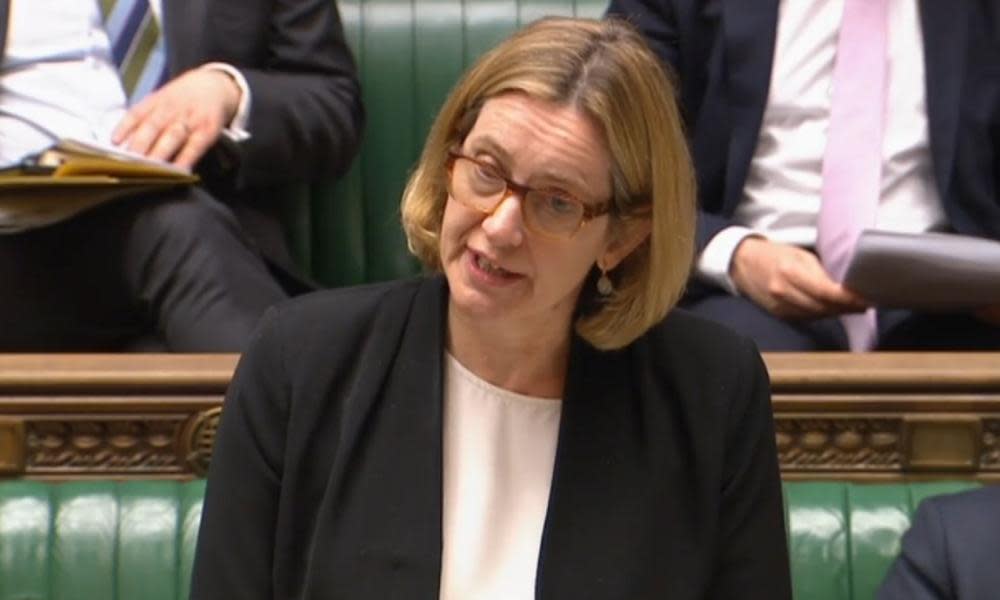Amber Rudd takes responsibility – for saving Windrush-era home secretaries

Amber Rudd was sorry. More than sorry. Gutted. Devastated. Sad Face. The treatment of the Windrush generation was just one of those things. A joke that successive governments had allowed to get out of hand over the past 30 years or so. It had never been her intention for anyone to get hurt in the process and she was determined to take whatever measures were necessary to make sure she and the prime minister held on to their jobs.
“I want the Windrush generation to get British citizenship,” the home secretary said during her Commons statement, inadvertently making a bad situation worse. The idea that people will be thrilled to be given something they already thought they had is deluded at best. Next she will be offering them the right to stay in their own homes.
Sad Face then went on to list some of the ways she proposed to save her career. There would be a compensation scheme – normal terms and conditions apply, check small print for exemptions – and a new “customer contact centre” staffed not just by any old civil servant, but by 50 senior case workers who had been trained to be extra friendly on the phone. Computer says maybe.
The heart soared. The largesse! Britain at its finest. Rudd pressed on. It was the state who had let the Windrush generation down, not any one person. Especially not her or Theresa May. Or the Home Office. The Home Office was a great office of state. So great that she would like to shake the hand of the person who was running it. Just as soon as she found who that was.
While Rudd had been on her feet, her parliamentary private secretary, Rachel Maclean, had been busy handing out a list of tame questions she would like Tory MPs to ask her. It hadn’t taken her long. Apart from four other Home Office ministers who had been instructed to turn up and were sitting miserable and stoney-faced beside her, there were fewer than 20 Conservative backbenchers in the Commons for this latest humiliation.
And even they were fairly muted in their support, with only Hugo Swire declaring his undying love. Shares in Rudd as the next prime minister have nosedived in the past week. Just about the only thing keeping her in post is the sense that if she goes, then May might fall with her.
Diane Abbott pointed out a few home truths. The problems had all begun with the “hostile environment” Immigration Act of 2014. An act that had been implemented by the prime minister and enforced with enthusiasm by Rudd. Time and again Labour had tried to warn of the effects of the legislation, but the government had ignored them. For the Tories, a few wrongly deported West Indians were a price worth paying for being a party that looked to be tough on immigration.
“The policy is not called ‘hostile environment’, Rudd observed. Sad Face became Hurt Face. “It was called ‘compliant environment’.” Shades of the Ministry of Truth. The idea the government had been trying to throw people out of the country was a nonsense. The whole purpose had been to protect people. By throwing them out of the country for their own good. They would be so much happier elsewhere. Somewhere they might be able to get the cancer treatment they were wrongly denied in Britain.
Labour backbenchers were understandably less than reassured. They wanted to know more details about the compensation scheme and what the government proposed to do about all those people who had come from Commonwealth countries after 1973 and were likely to fall foul of the same legislation as the Windrush generation. Rudd didn’t really have any clear answers, but she was sure it would be fine. Like it always had been in the past.
It wasn’t long before several MPs were calling on Rudd to do the right thing. Either to disown Theresa May’s hostile environment policy or to resign. Hurt Face became a little Hurter. “I do take responsibility,” she insisted. While giving every appearance of trying not to do so. The Ministry of Truth would have approved.

 Yahoo News
Yahoo News 
